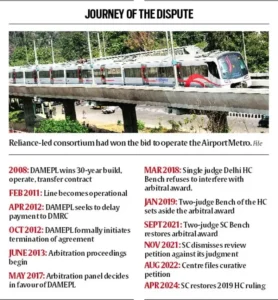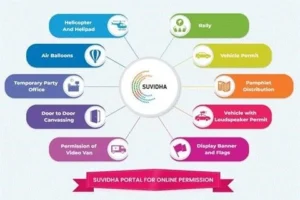Curative Petition
- News: The Supreme Court has granted permission for DMRC to pursue its curative petition challenging an arbitral award that favored DAMEPL (Delhi Airport Metro Express Private Limited, Reliance Infrastructure subsidiary).

Arbitration:
- Arbitration is the most traditional form of private dispute resolution. Arbitration is a binding procedure.
- It is often administered by a private organization that maintains lists of available arbitrators and provides rules under which the arbitration will be conducted.
- Such organizations can also manage the arbitration in whole or in part. Parties often select arbitrators on the basis of expertise.
- Any form of arbitration irrespective of its nature has been recognised statutorily in India by bringing such arbitration under the ambit of the Arbitration and Conciliation Act, 1996.
Arbitral Award:
- An arbitration award is the award granted by the arbitrator in their decision. This award can be money one party has to pay to the other party.
- For instance, in this case, the panel of three arbitrators decided in favour of Reliance and ordered DMRC to pay nearly Rs 8,000 crore in 2017.
- It can also be a non-financial award, such as stopping a certain business practice or adding an employment incentive.
- In simpler words, arbitral awards refer to the decision of an arbitral tribunal, whether in a domestic or international arbitration.
- As per the SC, an arbitration award can be set aside under the Arbitration Act, if it is found to be contrary to the fundamental policy of Indian Law, interest of country, justice or morality or if it is patently illegal.
Curative Petition:
- Origin and Purpose of Curative Writs:
-
- Curative petition is the last constitutional remedy available to a person whose review petition has been dismissed by the Supreme Court.
- A curative petition may be filed after a review plea against the final conviction is dismissed.
- Curative writ petitions are not explicitly provided for in the Constitution but are a judicial innovation.
- They aim to correct grave injustices in Supreme Court rulings.
- It is meant to ensure there is no miscarriage of justice, and to prevent abuse of process.
- This concept was first articulated in Rupa Ashok Hurra vs Ashok Hurra (2002), where the SC recognized the need to address significant miscarriages of justice despite the principle of finality of judgments.
-
Criteria for Filing Curative Writs: Curative writs are rarely used.
- Grounds for filing include violations of principles of natural justice, such as lack of opportunity to be heard or judicial bias.
Procedure:
- A curative petition must be accompanied by certification by a senior advocate.
- It must be first circulated to a bench of the three senior-most judges, and the judges who passed the concerned judgment, if available.
- Only when a majority of the judges conclude that the matter needs hearing should it be listed before the same Bench.
- A curative petition is usually decided by judges in chamber, unless a specific request for an open-court hearing is allowed.
- During the consideration of a curative petition, the Bench may request a senior counsel to assist as amicus curiae (“friend of the court”, one who assists the court by furnishing information or advice regarding questions of law or fact).
- If the Bench finds the petition to be meritless, it has the authority to impose significant costs on the petitioner as a deterrent.
Applications and Examples:
- Curative writs are commonly filed in death penalty cases, although they are not limited to such instances.
- The SC has dismissed curative writs challenging death sentences in cases such as the Yakub Memon case (2015) and the Delhi gang rape convicts case (2020).
- In 2023, the SC declined to use its curative powers to increase compensation for victims in the Bhopal gas tragedy case, deeming the existing compensation as grossly inadequate.
U.N. Membership Process
- News: UN Security Council refers Palestinian application to become full UN member to committee.
How does a country become a Member of the United Nations?
-
- Membership in UN is open to all peace-loving States that accept the obligations contained in the UN Charter and are able to carry out these obligations.
- The admission of any state to membership in the UN will be effected by a decision of the General Assembly upon the recommendation of the Security Council.
How does a new State or Government obtain recognition by the United Nations?
- The State submits an application to the Secretary-General and a letter formally stating that it accepts the obligations under the Charter.
- The Security Council considers the application.
- Any recommendation for admission must receive the affirmative votes of 9 of the 15 members of the Council, provided that none of its five permanent members (P5)have voted against the application.
-
-
- P5: China, France, the Russian Federation, the United Kingdom of Great Britain and Northern Ireland and the United States of America.
-
-
- If the Council recommends admission, the recommendation is presented to the General Assembly for consideration.
- A 2/3 majority vote is necessary in the Assembly for admission of a new State.
- Membership becomes effective the date the resolution for admission is adopted.
- It should be noted that the normal change of Governments, as through a democratic election, does not raise any issues concerning the credentials of the representative of the State concerned.
Suvidha Portal
- News: Over 73,000 applications have been received on Suvidha portal since Lok Sabha poll has been announced.
- Suvidha Portal: It is a technological solution developed by Election Commission of India to ensure a level playing-field upholding the democratic principles of free, fair and transparent elections.
Features:
- It works upon First in First Out principle.
- It caters to permissions for organising rallies, opening temporary party offices, door-to-door canvassing, video vans, helicopters, obtaining vehicle permits, distributing pamphlets.
- Political parties and candidates can seamlessly submit permission requests online from anywhere, at any time.
- Offline submission options are available to ensure inclusivity and equal opportunity for all stakeholders.

Importance:
- The Suvidha Platform enhances the efficiency of the election process.
- It also ensures transparency by providing real-time tracking of applications, status updates, timestamped submissions, and communication via SMS.
- The permission data available on the portal serves as a valuable resource for scrutinising election expenditures, contributing to greater accountability and integrity in the electoral process.

